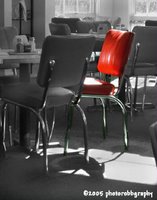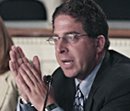Rick Hess On The HotSeat: A Liberals' Kind Of Conservative?
 Rick Hess might well be considered too hot for the HotSeat, if such a thing were possible. He's got three jobs, four advanced degrees, and he's EdWeek's favorite pundit. He's on every panel and at every conference, and he spins out books seemingly every six months (two already this year).
Rick Hess might well be considered too hot for the HotSeat, if such a thing were possible. He's got three jobs, four advanced degrees, and he's EdWeek's favorite pundit. He's on every panel and at every conference, and he spins out books seemingly every six months (two already this year). Even more, everybody seems to like him. He's liked the education version of David Brooks -- a conservative that liberals (and the media) can live with. [UPDATE -- well, not everybody --see comments.]
Read More...
On the HotSeat, Hess tries valiantly to avoid saying anything impetuous, but -- let this be a lesson -- the heat is simply too much. He ducks the issue of whether he's for vouchers (I'm guessing he's not) and debunks the notion that a big national effort is what's really going to improve education (someone should tell the competitiveness junkies). He says that says anybody who voted for NCLB in 2001 "ought to have the conviction to stand on principle now," and he denies rumors that a team of attractive young conservatives does all his work for him in a secret lair.
What's the best and worst part about being a rising star in the education world (as Diane Ravitch recently named you)?
RH: Not sure that I qualify as "a rising star"... but I will say that the best part of a heightened profile is the access it's given me to interesting thinkers, educators, and organizations. The worst part of the new opportunities and demands shrink the amount of time I'm able to spend in the field, reading, or doing research.
Is it true that a group of attractive young conservatives do all of your writing for you in a secret lair?
RH: I have been blessed with a string of phenomenal research assistants who are doing their best to carry me. They don't pen anything that appears under my name, but they offer outstanding editorial feedback, and they are responsible for just about everything else that we do.
Why no blogging (for you or any of the other conservative education folks)? It can't be that you've got nothing to say.
RH: Actually, while some may not believe it, I'm not really crazy about opining on new developments. I think that some writers prefer to deal with ideas and events from a distance and as abstractions, while others prefer to engage in practical ongoing debates. I feel more at home in the first school than the second. In general, I'm left a little cold by the opinion-mongering and attacking that's part of the whole online discourse.
Then why the weekly Gadfly Show you and Mike Petrilli just started doing as a podcast?
RH: Probably because I'm weak-- I enjoy the time with Mike and his team. More seriously, the podcast format seems more suited to the silliness that we engage in (like trying to sing the "Charter School Blues") than does blogging. At least for me, and it might be my academic training, the written word is different than the spoken word.
Speaking of conservative groups, how can I tell the right-leaning education groups apart? They all look the same to me.
RH: I think the big distinction is whether they're focused on a political agenda (like the Heritage Foundation, the Friedman Foundation, Cato, and the Lexington Institute) or whether they're primarily devoted to an intellectual agenda (like the Hoover Institution and the Manhattan Institute).
Where does AEI fit in?
AEI is a funny place. Like a university or the Brookings Institution, we don't hammer out institution-wide policies or have any explicit agenda. Our education program is whatever the scholars are working on that year. In most cases, that's determined more by intellectual interest than the policy agenda. Whether the topics or the takeaways are "conservative" in any particular sense is a judgment that your readers will have to decide for themselves.
So do you have any nontraditional positions when it comes to education -- are you against vouchers?
RH: It's hard for me to know what's nontraditional anymore. After all, the time was that being against vouchers was considered "traditional." I'm generally for reducing barriers to new providers, making it easier for folks to enter the educational sector, and encouraging attention to productivity and efficiency.

What would you say your biggest accomplishment at AEI has been?
RH: It’s been convening folks to pursue topics that I find interesting and important but that, for whatever reason, schools of education and advocacy organizations haven’t spent much time on. This includes the conferences and books I've done on educational philanthropy, educational entrepreneurship, the nontraditional loan market in higher education, licensure and teacher quality, and so on.
What about NCLB -- mend it or end it?
RH: I think we have to concentrate on mending it. NCLB is so big and so all-encompassing, that I'm not even sure what it would mean to end it. A lot of those programs aren't going anywhere. I would like to see the federal role simplified, focused on results (at least one reason to think about the national testing question), and then pared back. Checker Finn and I sketched a vision of what this would look like in our 2004 Public Interest piece.
If you were a Republican lawmaker who'd voted for NCLB, would be you be running away from that vote now or standing by it?
RH: Look, we all know how bills are really passed on Capitol Hill, especially when it comes to ambitious social programs. Most folks didn’t fully understand the law then, and are getting conflicting reports on it now. More snarkily, I’d say anybody who voted for the law without understanding how it was likely to unfold probably deserves the dilemma they're now in-- and anybody who thought it worth doing in 2001 ought to have the conviction to stand on principle now.
RH: What approach or circumstance is it going to take for there to be a concerted national effort to upgrade public education?
RH: I think this stuff always happens in dribs and drabs. Outside of mobilizing to win a world war, to tackle a bricks and mortar obstacle (like laying a highway system), or to pour resources into a specific technical challenge (like landing a man on the moon), I don't think national efforts tend to accomplish much. I think the results of federal efforts to reform the intelligence community, improve port security, or make Amtrak self-sufficient show just how hard it is to make a concerted national effort pay off.
So you’re debunking the notion that the US ramped up its science and math education to compete with the Russians, or that programs like Medicare aren’t national efforts?
RH: Oh, not really. We certainly did ramp up in '58 and some of the efforts, like increasing language mastery or research fellowships, worked as intended. What I'm skeptical of is whether the broader push did much good. I'd make pretty much the same case with regard to Medicare. It's certainly helped improve the quality of life for older Americans, but almost entirely by massively increasing the availability and affordability of health care for seniors. This is what government does well, mail out checks to providers. When it comes to all the ancillary questions posed by Medicare-- controlling costs, fiscal responsibility, encouraging efficiency, or ensuring quality of care-- I think the record is pretty bleak. These are the things government doesn't do well, foster creative problem-solving, productity, or organizational improvement.
How do things get better on the schools front, then?
RH: For my money, the key to improving schools isn't going to be a grand national effort, it's going to be a strategy that helps light a bunch of small fires and then fans them into flames. This requires a stream of venture capital, a deep pipeline of people, and the training and infrastructure to support the spread and adoption of new, more effective educational approaches.
3 Comments:
Rick Hess is mean, he promotes meanness in his books and articles, "tough love" and phrases like that. You shouldn't give him this sort of visibility, he's bad, very bad.
He is really mean to Linda Darling Hammond in his writing and in person. He hates teachers and everyone who speaks up for them.
Who are all these Hess groupies who post snarky in-joke comments? In what virtual coffee houses do they convene? Keep fanning the flames, kids.
Post a Comment
<< Home